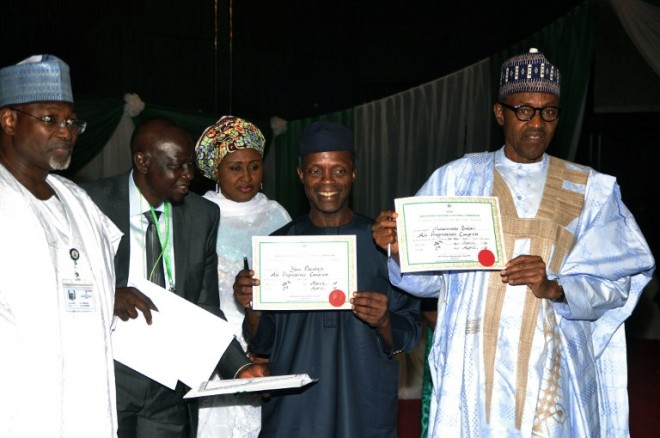
Nigeria’s President-elect Mohammadu Buhari (R) and his deputy Yemi Osinbajo pose after receiving their certificates of return from Independent Nigeria Electoral Commission’s (INEC) chairman Attahiru Jega (L) while Buhari’s wife Aisha (C) looks on in Abuja, on April 1, 2015. AFP
ABUJA, Nigeria–President-elect Muhammadu Buhari on Wednesday vowed to rid Nigeria of the “terror” of Boko Haram after his historic election victory marking the first democratic transfer of power in Africa’s most populous nation.
The 72-year-old former military ruler also pledged reconciliation with political opponents who fear a return to his autocratic regime of the 1980s, and a government representing “all Nigerians”.
“I assure you that Boko Haram will soon know the strength of our collective will and commitment to rid this nation of terror and bring back peace,” Buhari said in an acceptance speech after his dramatic win.
“We shall spare no effort until we defeat terrorism.”
Boko Haram, whose rampage through northeastern Nigeria has left more than 13,000 people dead in six years, is Buhari’s most pressing security problem.
READ: Wearing disguise, Boko Haram kills hundreds | Boko Haram said to kill about 45 people in Nigeria
He also promised to address a culture of political impunity and the “evil” of rampant corruption, but said there would be no witch-hunt and his beaten opponent Goodluck Jonathan had “nothing to fear”.
“Our long night has passed and the daylight of new democratic government has broken across the land. Democracy and the rule of law will be established in the land.
“Let’s put the past behind us, especially the recent past. We must forget our old battles and past grievances and forge ahead.”
Trailblazer
Buhari’s victory wrote a new chapter in Nigeria’s often turbulent political history, after six military coups since independence in 1960 and 16 years of unbroken civilian rule by Jonathan’s Peoples Democratic Party.
UN chief Ban Ki-moon and US President Barack Obama led the congratulations for Buhari.
But it was Nigeria’s unprecedented democratic transfer of power that won the most plaudits internationally.
“The last few days have shown the world the strength of Nigeria’s commitment to democratic principles,” Obama said, while his top Africa diplomat said Nigeria had raised the bar for the continent.
“Nigeria is a trailblazer,” Assistant Secretary of State for African Affairs Linda Thomas-Greenfield told AFP.
“They have sent a huge, huge example across Africa that democracy and change of government can work and it can work in a free and fair election.”
The US President later telephoned both President-elect Buhari and outgoing leader Jonathan, praising both for their role in the historic democratic power transfer.
Obama spoke to the men separately to “commend them for their leadership during Nigeria’s election”, the White House said.
Buhari had praised Jonathan for his statesmanship in conceding defeat before the final result was declared, helping to defuse the potential for poll-related violence and lengthy legal wranglings.
In a statement, the heads of international election observation missions including the African Union and the European Union congratulated Nigeria and its people “for their commitment to a peaceful response to the election results”.
Challenges ahead
Buhari’s victory by 2.57 million votes, confirmed early Wednesday, came after a gripping weekend contest hit by glitches with new voter technology, claims of irregularities and Boko Haram fears.
Political violence which has blighted the aftermath of previous votes in the country of 173 million people failed to materialize.
Instead Buhari supporters thronged the streets, many chanting “change, change” and brandishing wicker brooms, his party’s symbol, with which they have pledged to sweep away years of government corruption and waste.
In Kaduna, a flashpoint state in the north central region where many of the 1,000 people who lost their lives after the last elections in 2011 were killed, there were jubilant scenes.
Muslims in the religiously mixed state brought cows, chickens and sheep to slaughter, but some reflected on the huge challenges that lie ahead for the incoming president.
“Today it’s like we’ve gotten our freedom,” student Muhammad Sani Albari told Agence France-Presse.
“We have been ruled for the past 16 years by the… PDP. They have been ruling us and no jobs, no good roads, no hospitals, no infrastructure.
“There is nothing here to talk about.”
God’s will
Celebrations extended into a second day in Buhari’s home town of Daura in northern Katsina state, but residents said they were not expecting any special favors from their favorite son.
“Buhari never gave Daura any preferential treatment when he was head of state or when he was chairman of the PTF (Petroleum Trust Fund),” said resident Ahmad Tijjani.
“I’m sure he will not do it now.”
There was disappointment in Jonathan’s home town of Otuoke in the oil-rich southern Delta region, where near total support for the president was not enough for him to cling on to power.
“Since it is the will of God that Buhari should win, we have no choice than to accept,” said Elijah Ateki, chairman of the Otuoke community development committee.
“We are not going to cause any trouble over it because we cannot question God and the voice of the people.”
But others in the Christian south raised fears of marginalization by Buhari, a northern Muslim, laying bare Nigeria’s religious and ethnic faultlines that he will have to work hard to overcome.
Niger Delta militants, who wreaked havoc in the maze of creeks and rivers of the Delta in the 2000s, have threatened to take up arms again if a government amnesty that paid them off is not renewed later this year.
RELATED STORIES
Nigeria postponing Feb. 14 vote amid Boko Haram violence
IS accepts Boko Haram allegiance pledge